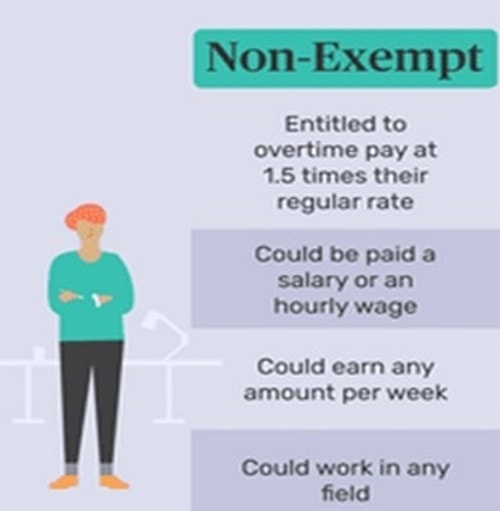Table of Contents
Definition of Non-Exempt Employees
Employees who work as per the FLSA (Fair Labor Standards Act) regulations are defined as Non-Exempt Employees. FLSA decides the minimum wage and overtime laws for the non-exempt employees.
Unless an employee earns a salary, earns at least $23,660 per year and some other high-level jobs that qualify for an exemption, all other sorts of employees are considered as Non-Exempt Employee.
Let us now understand the meaning in a more detailed fashion
Meaning of Non-Exempt Employees
You must have always heard about the salaried employment where you get a fixed salary at the end of the month. This is the exempt type of employment. But there is also another type of employment just opposite to the salaried one and this is the nonexempt employment or the hourly basis payment employment.
In such kind of employment, the employees are paid as per the number of hours they are working. Also, such people entitled to get overtime pay. The overtime payment of such employees is calculated as 1.5x the hourly payment, for every extra hour after working 40 hours a week.
Let us now understand the concept with a few examples
Example of Non-Exempt Employees
You are hiring an employee to work for 30 hrs in a week for the job profile of receptionist.
Job responsibility is answering phone calls and connecting callers to the right department.
Wages are decided on an hourly basis.
You pay $340 per week.- The employee is termed as Non-Exempt Employee.
There are a number of benefits that the nonexempt employees do enjoy. Also, there are a number of benefits that the employers enjoy who have such employment at the office.
Let us delve into that one by one
Advantages of Non-Exempt Act for the Employees
1) Working as per Convenience
There are both benefits as well as downfall to the hourly basis workers. One of the most amazing benefits of them is that they do not have to follow the timings at times. There are a number of companies that do not maintain a strict time zone for such employees.
They simply pay for the hours the employee is working. Hence, the employees can work as per their convenience.
2) Opportunity to earn more
Secondly, when there is an option of overtime, a number of employees take benefit of this opportunity and easily land up earning almost double than the other members of the team.
At times, there are many companies that offer double for the holidays and some of the employees get benefitted out of it by working on such days. On top of that of course, overtime payment is there that makes them a lot of money.
Disadvantages of Non-Exempt Employment for Employees
Along with the benefits, there are a number of disadvantages also for such employees.
1) The sudden dismissal of employees
It has been noticed that at times there are companies that may not have much work and hence may dismiss the employees at times much before the scheduled time. In this case, the payment is reduced as they are hired for hourly work.
2) Lesser number of facilities
Also, such employees are not entitled to a number of facilities that are designed for the salaried employees such as bonuses, retirement plans, and many more.
So, this means the nonexempt employees enjoy benefits but also do have to suffer a number of disadvantages. So, it is very important to analyze both of them and then join such an opportunity.
Let us now have a look upon the benefits of nonexempt employment for the employers-
Benefits of Non-Exempt Employment for the Employers
While you have known the various benefits that the employees enjoy under the nonexemption category, there are a number of ways how the employers also get benefited out of such employment option.
1) Proper Control Of The Pay Cost
When it is an hourly basis payment scheme, the employers are sure that they are paying exactly for something productive work that has been done by the employee. In the case of the salaried person, it may happen that on a specific day the person may have not worked at all but will take the regular salary at the end of the month. This is not the case for nonexempt employment.
The employees are paid only for the number of hours that they have worked for. This is the reason; it actually does not hurt much when they are paid for the extra time that they are working.
2) Minimum Wage
As per the minimum wage rule, the minimum wage of the hourly employee should be of $7.25 for each hour. On the other hand, the salaried employees have a minimum wage of about $455 per week that makes about $11.38 for each hour when they are working about 40 hours a week.
So, the salaried employees enjoy a higher wage in comparison to the hourly ones. Here, the employers are enjoying the benefit of paying much lesser for the minimum wage to the employees. Even when the overtime is paid, it does not matter much because some productive work is completed in that particular extra time.
3) Simpler Calculations
The hourly payment of the employees can be calculated quite conveniently. Also, the calculation of the overtime hours is done even more comparatively. The nonexempt employees are paid about 1.5x the hourly pay for each hour that has been worked extra after 40 hours or work each week. Based on this simple calculation, the employees are provided with their extra wages.
4) Saving On The Facilities
It has been mentioned before that along with the benefits, the employees also need to face a number of disadvantages of being in the nonexempt employment opportunity. One of the major disadvantages is that the employees do not get the benefits and facilities that the exempt employees enjoy.
There are some of the basic benefits that the salaried employees enjoy such as a retirement plan, bonuses each year, paid leaves, and many other facilities. These facilities allow them to have a relaxed working environment and also assure them to have a relaxed life even after they have left the work because they get a lump sum amount that has been saved from their salary, after leaving the company. Such facilities are not provided to nonexempt employees.
Though this is a sort of disadvantage for the nonexempt employees this is definitely an advantage for the employers.
The employers just have to pay for the hours that the employees are working and apart from this there is no such burden of paying anything extra such as the benefits and facilities.
Conclusion
Every job type has its own advantage and disadvantages.
The exempt employment has many benefits but the employees cannot earn extra by working overtime. On the other hand, the nonexempt employment offers the option of earning extra but the employees are not provided with the special benefits that the exempt employees get.
The employers keep such conditions of salaried employment of hourly employment based on their benefits and convenience also. Hence, there are both positives and negatives of both types.
It is only that the employees need to decide whether their preference is to earn extra or to get other benefits. It is entirely a personal choice of an employee.
So, how beneficial do you consider nonexempt employment for you? Or would you prefer to be an exempt employee? Share with us in the comments below.
Liked this post? Check out the complete series on Human resources




